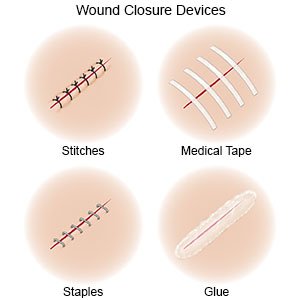Inguinal Hernia Repair
Medically reviewed by Drugs.com. Last updated on Aug 4, 2025.
What do I need to know about an inguinal hernia repair?
An inguinal hernia repair is surgery to place bulging tissue and intestines back into your abdomen. The weakened abdominal wall is also repaired. Your surgeon may use open surgery or a laparoscopic method. Open means your surgeon will make 1 large groin incision to repair your hernia. Laparoscopic means your hernia will be repaired through 2 to 3 small incisions.
How do I prepare for an inguinal hernia repair?
- Your surgeon will tell you how to prepare. Your surgeon may tell you not to eat or drink anything after midnight on the day of your surgery. Arrange to have someone drive you home when you are discharged.
- Tell your surgeon about all your current medicines. Your surgeon will tell you if you need to stop any medicine for surgery, and when to do so. You may be given antibiotics to help prevent a bacterial infection or bowel prep medicine before surgery. Your surgeon will tell you when to start and give you instructions to follow.
- Tell your surgeon about any allergies you have, including to medicines or anesthesia.
- Your surgeon will tell you if you need tests before your surgery, and when to have them.
What will happen during an inguinal hernia repair?
- You will be given general anesthesia to keep you asleep and pain free during surgery. You may also be given local anesthesia and medicine to help you relax and numb the surgery area.
- During a laparoscopic hernia repair, your surgeon will make a small incision above or to the side of your hernia. Your abdomen will be filled with carbon dioxide to lift the muscles away from your organs. This creates space for your surgeon to work. Your surgeon will insert a laparoscope. A laparoscope is a long, thin tube with a light and camera on the end. Other instruments will be inserted into 2 to 3 smaller incisions at different places on your abdomen.
- During an open hernia repair, your surgeon will make 1 incision near your groin. The incision size will depend on the size of your hernia.
- In both types of hernia repair, tools are used to remove the hernia sac that contains bulging organs or abdominal tissue. Your surgeon will move your organs or tissue back into the correct place. Stitches or mesh may be used to close or cover the abdominal wall. This will prevent the hernia from bulging out again.
- Your incisions will be closed with stitches or medical glue and covered with bandages.

What will happen after an inguinal hernia repair?
- You will be taken to a room to rest until you are fully awake. Healthcare providers will monitor you closely for any problems. Do not get out of bed until your provider says it is okay.
- You will be helped to walk around after surgery. Movement will help prevent blood clots.
- You may have swelling just under the incision if you are female. If you are male, you may have swelling or bruising in your scrotum. You may feel pain around the incision sites. This is expected and should improve within a few weeks. You may be given medicine to help manage the pain.
- You may be able to go home when your pain is controlled, you can drink liquids, and you can urinate.
What are the risks of an inguinal hernia repair?
Your organs, blood vessels, or nerves may be injured during surgery. You may bleed more than expected or get an infection. A pocket of fluid may form under your skin. This may heal on its own, or you may need surgery to remove it. You may have temporary difficulty urinating after surgery. Problems, such as a hole in your intestines, may happen during laparoscopic repair. This may lead to open surgery. You may have constant groin pain or another hernia. You may get a blood clot in your leg or arm. This may become life-threatening.
Care Agreement
You have the right to help plan your care. Learn about your health condition and how it may be treated. Discuss treatment options with your healthcare providers to decide what care you want to receive. You always have the right to refuse treatment. The above information is an educational aid only. It is not intended as medical advice for individual conditions or treatments. Talk to your doctor, nurse or pharmacist before following any medical regimen to see if it is safe and effective for you.© Copyright Merative 2025 Information is for End User's use only and may not be sold, redistributed or otherwise used for commercial purposes.
Further information
Always consult your healthcare provider to ensure the information displayed on this page applies to your personal circumstances.
